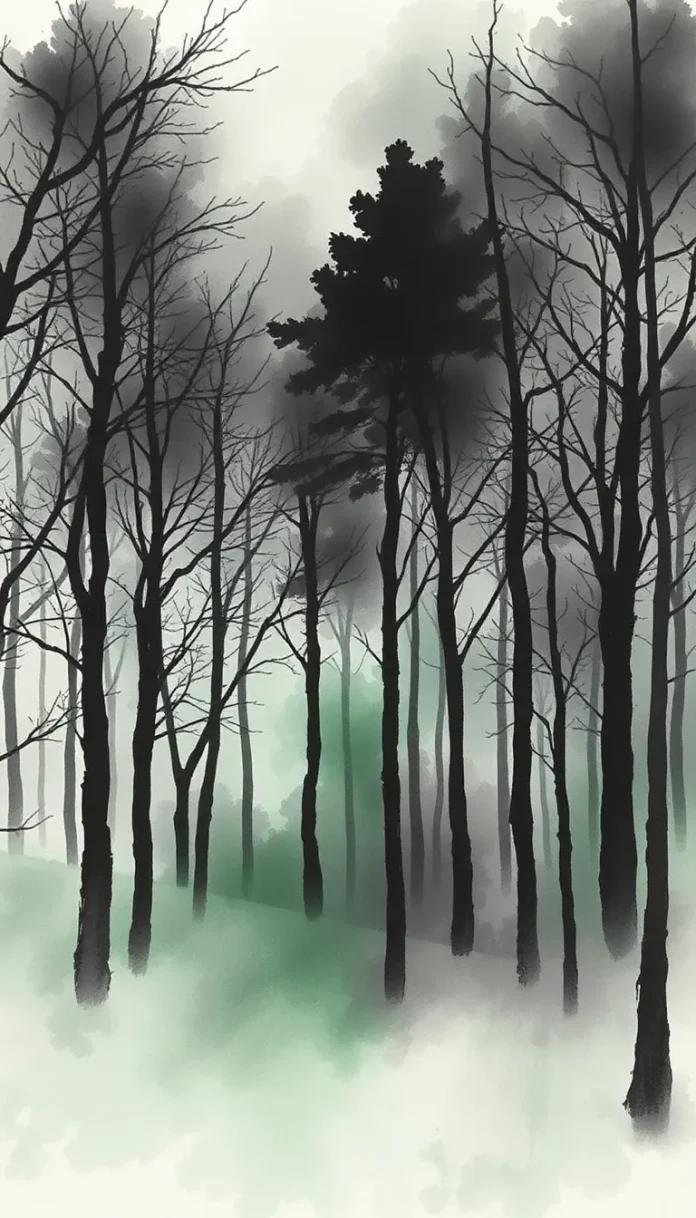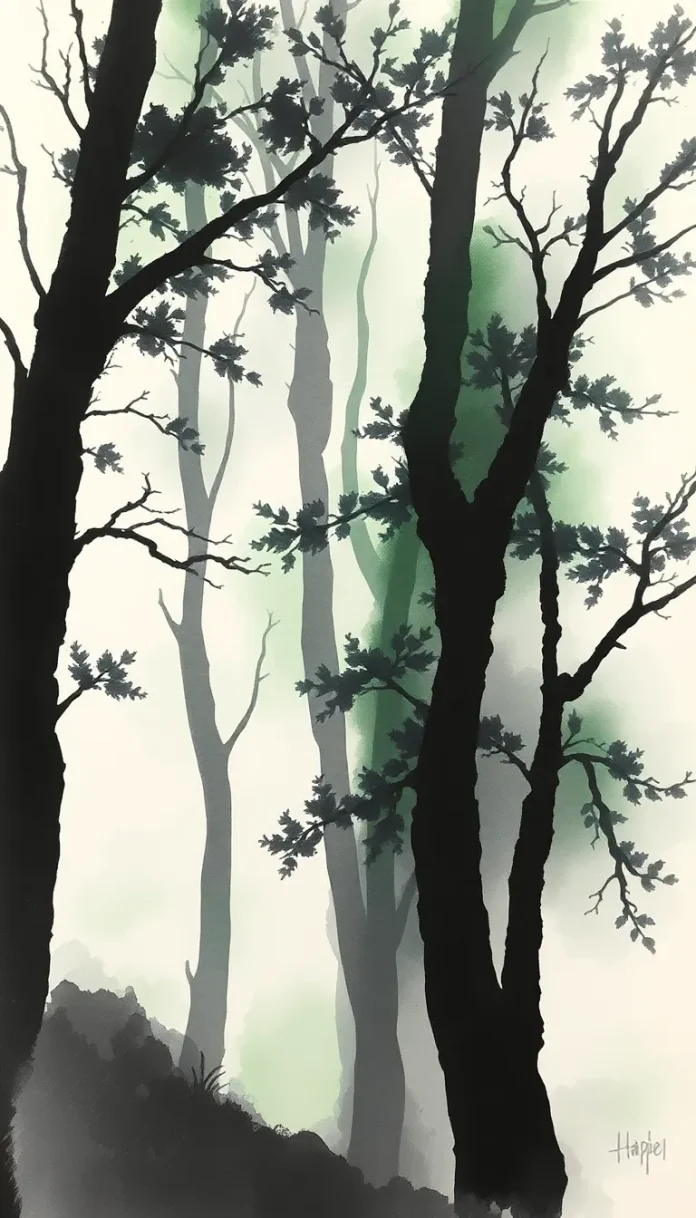Epoch of Forgotten Whispers
In corridors where dust danced like gentle spirits, the ancient arches and weathered stone bore witness to the wanderer’s slow, measured steps. His eyes, deep and tremulous as twilight reflections, mirrored countless unsung stories, each a delicate thread in the tapestry of his own elusive self. In quiet awe, he beheld the faded murals and rusted tracks that once carried the ardor of countless farewells and embraces—a silent ballet of arrivals and departures that now lay lost in the obscurity of time.
“Mark how the silence speaks!” he murmured into the void, his voice a spectral caress against the damp chill of solitude. The ghostly echoes of a long-forgotten train’s horn reverberated across empty platforms—a melancholic lament that ensnared his spirit in a web of bittersweet reminiscence. Thus embarked his quest, not merely for the relics of memory, but for the truth of his own being, entwined with the spectral vestiges of past lives and unfulfilled promises.
Beneath a vault of twilight’s gathering shade, Rêveur paused by a fractured window, its glass like a portal into other realms where time, unbound by mortal constraints, wandered free. The faded silhouettes of conversations long since silenced danced upon the pane. “Were we not but travelers, questing for a home within ourselves?” he whispered, as if addressing an unseen confederate. Within his heart stirred an inquiry formidable and eternal: who, indeed, was the man beneath the cloak of wistfulness and yearning? And the answer lay hidden, like a fragile blossom beneath a winter’s snow.
Across cracked floors and beneath the skeletal beams of whitewashed columns, he recalled fragments of a past life—a life woven in laughter, love, and melancholy farewells. He recalled a laugh that had once filled the corridors of his soul with fire, and the gentle murmur of a confidante whose eyes had shone with an inner light as profound as the celestial tapestry above. Yet here, in the midst of desolation’s embrace, such echoes were but bittersweet apparitions, haunting relics of a self long estranged from the present.
Thus commenced his pilgrimage through the labyrinth of abandoned memories, threading his way through corrugated arches and overgrown secret nooks, seeking the whispered truth that lay buried within him. In the quiet chamber of a forgotten waiting room, where time seemed to suspend its relentless chime, the wanderer encountered a peculiar relic—a weathered diary, its pages fragile as autumn leaves. With gentle hands trembling in both reverence and trepidation, he turned the yellowed pages, each word inscribed with ink that glimmered like distant stars.
“Herein lies the soul of what once was, and what might yet be,” the diary seemed to presume in a silent soliloquy. And so, Rêveur became the archivist of forgotten voices, reading aloud the musings of a life lived in the shadow of ephemeral dreams. His voice, soft and resonant, broke the silence of that forsaken chamber: “I too have walked these corridors of memory, and I too have felt the chill of isolation, for what is life but the quest to find oneself within the echo of our own longing?”
Emboldened by the fervor of such revelations, our lamenting wanderer ventured deeper into the maze of timeworn relics. Beneath a crumbling canopy of ivy and rust, he discovered an old carriage, its door ajar as if inviting him to dream further. Climbing into the dusty recess of that once noble conveyance, he allowed his mind to drift amidst the ghostly murmur of forgotten destinations. There, amid the silent rustle of leaves and the creak of bending metal, he spoke in a hushed tone to the lingering specters: “Show me the path by which I might unearth the cradle of my origin. Let this heart be no longer a barren plain, but a fertile field where hope, like wildflowers, may bloom once more.”
Outside, the night matured into a velvet cloak studded with shimmering silver, and the Vieille gare seemed to breathe with a timeless cadence—a heartbeat echoing through the corridors of solitude. Rêveur’s journey became a dialogue between man and memory, wherein every whispered refrain and every sigh of wind composed a sonnet of lost time and the search for self. Outside the neglected foyer, the ancient iron rails extended like dark tributaries, each one a saga of journeys embarked upon and destinations forever deferred.
Within this arena of reverie and isolation, the past and present wove inextricably—a delicate interplay of light and shadow. In the golden glow of his introspection, Rêveur encountered other enunciated phantoms of previous wanderers—fragments of souls that once trod these marbled halls. Their voices, barely more than the rustle of dried leaves, recounted tales of existential wonder and the perennial ache for identity. “Do we not all yearn for the promise of self-understanding?” they seemed to chant in unison, their chorus a soft lullaby to the aching heart of the station.
In a hall lined with memories, the imitation of conversation grew marked by brief, resonant exchanges—a dialogue between the lingering past and the indomitable present. Amid the murmurs, the voice of an unnamed traveler echoed, “I have been lost in these winding halls, a solitary sojourner whose soul dances with dusk and awaits the clarion call of morning. Yet each step forward is but a ripple in the still water of being.” This soliloquy, both reflective and questioning, imbued Rêveur with a profound empathy for the unknown vagrant spirit of the place—each story, a mirror to his own internal quest.
Thus, Rêveur wandered, and in his wandering, the abandoned station transformed into a vast canvas upon which the hues of hope, despair, and resilience were intertwined. The derelict corridors, once harbingers of loneliness, now resonated with the eternal question: what is the nature of our identity, and where does it lie hidden beneath the layers of dust and memory? Night after night, under the faint illumination of a solitary lampbroken or moonlight refracted through ancient glass, he penned verses in his mind—a lyrical diary of longing and relentless hope.
At the heart of the decay, where shadows mingled with the glimmers of forgotten light, Rêveur’s inner monologue now sought consolation amid the interplay of time and solitude. “Am I not as this ruined station,” he mused in a tone at once lamenting and defiant, “battered by the relentless gusts of fate, yet still harboring a spark of untamed wonder? For in my isolation, within this crumbling sanctum of memories, I perceive the seed of renewal—a chance to rediscover the contours of the self that have long lain dormant.”
In a doorless chamber where the airy draft carried faint strains of a bygone melody, Rêveur beheld an enigmatic mural depicting a labyrinth of intertwined vines and winding paths—a visual allegory of the tortuous voyage of identity. He approached with reverent silence, as if each brushstroke whispered secrets of ages past. “Herein lies the eternal dance of introspection,” he intoned softly, “a reminder that even in isolation, the spirit continues its ceaseless quest for meaning, entwining itself with the endless tapestry of existence.”
Each stanza of the mural spoke to him of a destiny unfulfilled but ever beckoning, a journey woven with the threads of solitude and the quiet splendor of becoming. In that instant, the Vieille gare, though marked by decay and resignation, metamorphosed into a hallowed sanctuary where the echoes of the past intermingled with the promise of self-discovery—a profound truth known yet unspoken by those who dared to dream in defiance of time’s erosion.
Even as dawn’s tentative blush crept over the horizon, a symbolic interplay between darkness and light, Rêveur’s musings grew ever more fervent. He recalled whispered conversations with the phantoms of the station, where each echo was a clue, a signpost on the winding road to his own essence. “Could it be,” he asked the silent void, “that all our solitary journeys, marked by trials and tender revelations, are but preludes to an awakening that transcends mere existence?” His query lingered amid the cool, dewy air—a question as timeless as the stars beyond.
In the quiet of that rapt moment, a gentle breeze stirred the fallen pages of his newly inscribed diary, and with it, the soft cadence of hope seemed to echo from a realm just beyond grasp. With every step he took towards the deserted platform’s farthest end, the rhythmic clatter of his own footsteps became a metronome guiding him through the labyrinth of memory and desire—a steady pulse urging him to embrace both the ache of separation and the anticipation of reunion with a self long hidden.
Along the length of the shattered platform, he encountered a cluster of wildflowers emerging defiantly from the fissures of stone—a vivid burst of life amid the desolation. Their delicate petals, brushed by the ancient light of a lingering sun, became for him symbols of resilience and rebirth in a place overshadowed by abandonment. “O fragile bloom,” he whispered, “you proclaim that even amidst the ruins, beauty can blossom anew. Let your vibrant hues be a testament to the eternal promise that from despair may arise unexpected grace.”
Thus, in the interplay of natural splendor and ruined grandeur, an unspoken communion unfolded between the wanderer and the very soul of the station—a conversation of silent truths and timeless dreams. Through each rustle of wind and soft murmur of nature reclaiming what man had forsaken, Rêveur gleaned lessons on the transient nature of identity and the ineffable power of transformation even in isolation.
One starlit eve, as the pale beam of a solitary lantern zigzagged along cracked walls, Rêveur encountered a curious relic—a tarnished pocket watch, its face frozen in a moment of eternal pause. As he knelt to examine it, his touch evoked memories of a time when every tick and tock was imbued with the promise of forthcoming adventures. “What is a moment but a delicate intersection,” he reflected, “where past, present, and future convene to offer us but a glimpse of the infinite journey within?” In that profound contemplation, the watch became a metaphor for his own suspended existence—a vessel capturing time, while he himself sought liberation from its relentless passage.
Through furtive murmurs and beams of gentle radiance dancing across shattered stone, the station began to reveal itself not merely as a relic of abandonment but as a mirror reflecting the multifaceted nature of the human soul. Every whisper of wind, every creak of settling decay, convoked in Rêveur a dialogue with his innermost being—a call to envisage a self reawakened by the sheer magnitude of its accumulated silence and the prospects of renewal.
There were moments when the specter of isolation felt overwhelmingly immense, a cavernous void echoing back the solitary notes of his thoughts. “In solitude, do we truly lose ourselves, or do we unmask the hidden contours of our being?” he would softly ask into the night, his voice both an echo and an incantation. And in the silence that followed, amidst the crumbling vestiges of forgotten farewells, lay an answer not yet fully understood—a seed of hope that in isolation, the soul is liberated to unfold its own mysteries.
With each passing night, as the velvet darkness deepened and the ancient walls murmured their own quiet elegies, Rêveur’s narrative evolved. Embracing the duality of his existence—that of isolation yet profound introspection—he began to document his journey in verses that intertwined with the very fabric of the station. His words, delicate as spun silver, recorded the interplay of shadows and light, the interplay of regret and the promise of self-reclamation. In his personal soliloquies, he invited the station itself to speak: “Dear silence, my constant companion, reveal unto me the map of my soul as etched in the faded carvings upon these ancient stones.”
The station’s recondite murmurs answered in layers of allegory. A fragmented mosaic along a narrow passage portrayed a labyrinth where minstrels and wanderers met in a dreamlike dance of ephemeral lives. Each fitted fragment—representing joy, sorrow, ambition, and despair—coalesced into a portrait of humanity’s relentless search for meaning. Rêveur, gazing upon the mosaic, felt the stirring of something ancient and profound within him. “So must I become,” he intoned with renewed fervor, “a pilgrim in search of fragments of my own spirit—a mosaic of memories, each shard both painful and luminous.”
Midnight found him by the grand iron gate that once welcomed the departing and the arriving, now a rusted portal leading to realms both infinite and unknown. In this solitary vigil, the night air carried the murmurs of perennial truths: that every soul is destined to wander, that every path carved by isolation may yet lead to a revelation of self. As he stood, transfixed by the interplay of light on decayed metal, a solitary voice—a memory of a half-forgotten dialogue from years past—rose in his mind: “The quest for identity is a journey with no final destination; it is an ever-unfolding odyssey, as uncertain and boundless as the shifting stars.”
With such reflections echoing in his heart, Rêveur felt a stirring of resolve, as if the station itself had awakened something in him. Whether it was the gentle coaxing of destiny or the silent instruction of solitude, he realized that his journey was not to find an endpoint neatly prescribed, but rather to embrace the endless interplay of absence and presence, of loss and discovery. With each tentative step forward across the fragmented mosaic of his existence, he was writing a saga of resilience—a narrative inscribed in the annals of loneliness and hope.
In those lingering hours before dawn, when the world seemed suspended between the final whisper of night and the inaugural murmur of day, Rêveur lingered upon the threshold of his own self-realization. The old station, with its myriad echoes and spectral vestiges, had become both a tomb for forgotten dreams and a crucible for rebirth. Here, in the interplay of ruin and reverie, he discerned an immutable truth: that identity is not a singular, fixed monument, but a living, evolving narrative—a mosaic constructed from the interplay of memory, solitude, and desire.
And so, when the first golden tendrils of morning light crept stealthily over the horizon, Rêveur emerged from the labyrinth of his own introspection with a heart both heavy with remembrance and buoyed by the resonance of unspoken promises. Standing once more at the threshold of the Vieille gare abandonnée, he gazed upon the interplay of shadow and luminescence, wherein every crumbling stone and every whisper of wind bore witness to the eternal human quest: to reclaim the lost shards of one’s soul amidst the ruins of the past.
He spoke softly into the cool morning air, as if addressing an audience of ancient spirits and silent witnesses alike, “I journey still, for there is no end, but only an everlasting pilgrimage—a mosaic uncompleted, forever awaiting the next fragment of self to be revealed.” His words, carried on the breeze and intermingled with the rustling of wildflowers at his feet, resonated with a melody that seemed to declare both farewell and anticipation.
As the Vieille gare slowly yielded to the arrival of day, its silhouette both melancholic and majestic against the burgeoning light, Rêveur took a final, lingering look upon the station—a place that had become the crucible of his transformation, a liminal space where the echoes of isolation nurtured his deepest introspections. And in that moment, the promise of an uncertain future shimmered like a distant beacon among the ruins.
The station, still cradling the whispered secrets of countless lost journeys, remained open to endless possibilities, its doors metaphorically ajar to embrace the echoes of those who dared search for meaning in the interplay of solitude and remembrance. And so, as Rêveur stepped away from the threshold, his thoughts remained suspended in that fragile liminality—a state where every ending was but a beginning, every farewell a prelude to renewed discovery.
In the radiant silence of the uncertain dawn, the journey continued—its path undefined and its culmination unwritten. The reflective solitude of the Vieille gare, with its ancient whisper of unresolved destinies, promised not a conclusion but a perpetual invitation to wander, to wonder, and to seek the elusive mosaic of identity. And so, in that eternal twilight between what was and what might yet be, Rêveur’s silhouette slowly merged with the light, leaving behind a legacy of soulful inquiry—a narrative open, a question unfurled, and a future where every step forward was but another whispered verse in the interminable ode to being.
Thus the echoes of that fateful night, entwined with the reverberations of forgotten dreams and timeless truths, resound still among the ivy-clad ruins of the Vieille gare abandonnée—a testament to the ceaseless human odyssey of self-discovery amid isolation, a journey that in its openness, defies conclusion and beckons ever onward.


